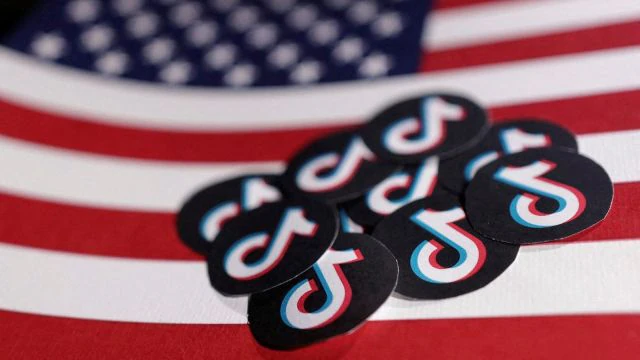What is the law that targets TikTok as the clock ticks down? Will the case stand up in court? How will the prohibition be put into effect?
This illustration was taken on April 24, 2024, and shows the TikTok logos and the US flag.
This illustration was taken on April 24, 2024, and shows the TikTok logos and the US flag. (Photo: Reuters)
As the Supreme Court is ready to rule on the constitutionality of a bill that would effectively shut down the social media network for more than 170 million users in the US, speculation about TikTok’s future is intensifying.
According to reports, the Supreme Court heard oral arguments over the bill on January 10 and seemed likely to uphold it. ByteDance, the parent firm of TikTok, which is based in China, may be able to evade the nationwide ban if the law is maintained by selling its US operations to a non-Chinese-owned business. But it’s easier said than done.completed because the sale must be finalized by January 19, 2025.
What is the law that targets TikTok as the clock ticks down? Will the case stand up in court? How will a platform ban be put into effect? Have a peek.
What legal framework underlies the de facto TikTok ban?
A perceived danger from China is partially responsible for the law. The Chinese government may utilize its national security laws to demand that ByteDance turn over US customer data, which has alarmed the Biden administration and US politicians. They fear that by altering the video-sharing app’s algorithm, China may utilize this information to spy on Americans and spread its propaganda. China allegedly utilized TikTok to influence the 2022 US midterm elections, according to a report published by the Office of the Director of National Intelligence in March 2024.
The Protecting Americans from Foreign Adversary Controlled Applications Act (PAFACA) was enacted by the US Congress with significant bipartisan support, and a month later, President Joe Biden signed it into law.
The law gives the federal government the authority to prohibit any foreign-owned applications that are thought to be a national security risk.However, TikTok is not specifically targeted by the law’s provisions. Rather, the law targets cloud service providers like Oracle as well as middlemen who facilitate program downloads, such as Apple’s program Store and Google’s Play Store.
Such marketplace businesses and internet hosting providers are prohibited by the PAFACA from “distributing, maintaining, or updating (or enabling the distribution, maintenance, or updating of) a foreign adversary controlled application.”
Notably, access to TikTok by individual users in the US is not prohibited by law.
What were the main points of contention in the US Supreme Court case?
The regulation was challenged in May 2024 by TikTok, ByteDance, and several American users of the software, who claimed that the law represses the free speech of a majority of the population
But in December, a lower court affirmed the law’s constitutionality. After that, TikTok petitioned the Supreme Court for an emergency injunction to temporarily halt the statute.
Attorneys representing TikTok and its users contended in the courts on January 10 that worries about possible information manipulation by the Chinese government did not justify the statute. “The case is over and the government simply cannot say ‘national security.'” Saying “national security” is insufficient; you also need to ask “what is the real harm?” The New York Times cited Jeffrey Fisher, who represents TikTok users, as saying.
However, the Biden administration defended the statute, arguing that it permits free expression on TikTok when the platform is freed from foreign control “TikTok could present the same stuff from the same users using the exact same algorithm if it could. US Solicitor General Elizabeth Prelogar contended that the act is merely an attempt to surgically eliminate a foreign adversary nation’s capacity to obtain our data and exert influence over the platform.
According to reports, all nine justices of the Supreme Court seemed less convinced by TikTok’s First Amendment claims than by the government’s defense of the statute. “TikTok is not required by law to close. According to Axios, Justice Amy Coney Barrett stated, “It says ByteDance has to divest.”
the case’s verdict this week, according to NYT.
How would one be banned from TikTok?
The wildly popular app will no longer be accessible for download on iOS and Android smartphones if the Supreme Court upholds the law and ByteDance is unable to divest TikTok.
For US customers who currently have TikTok installed on their smartphones, the app won’t go away suddenly. Rather, it might be more difficult to use the program, which may feel glitchy, run slowly, and crash frequently.It is also possible that users who try to open TikTok after January 19, will see a prompt indicating that the service is no longer available in the country. Indian users are shown a similar prompt as the central government banned TikTok in 2020 after border tensions with China escalated into deadly violence.
While workarounds such as using VPNs or ‘sideloading’ are being floated on social media, it is likely that a potential TikTok ban will lead to new apps (like RedNote) and existing platforms (like Instagram) vying for its many displaced users.
Can Trump save TikTok?
The Supreme Court’s ruling is likely to leave TikTok counting to be saved by US President-elect Donald Trump, who will be sworn into office a day after the deadline, that is, January 20.
Trump has been ambivalent in his stance on banning TikTok. He spearheaded the initial effort to ban the app in 2020 via an executive order, which was later overturned by multiple federal courts
But since then, he has become a staunch defender of the platform. Last month, Trump’s lawyers urged the Supreme Court to pause the TikTok ban so that the incoming president would have time to “resolve the dispute through political means.”After taking office, Trump could urge the US Congress to repeal the divest-or-ban law, or he could direct the Department of Justice to not enforce the legislation. Legal experts also pointed out that Trump could “just declare” that TikTok has complied with the law after it takes certain steps.




